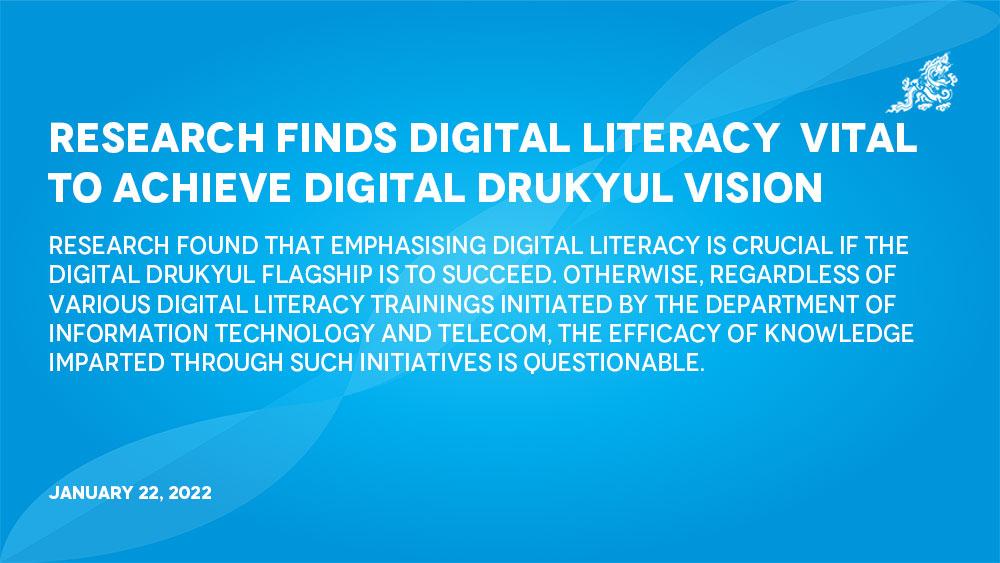Research found that emphasising digital literacy is crucial if the Digital Drukyul Flagship is to succeed. Otherwise, regardless of various digital literacy trainings initiated by the Department of Information Technology and Telecom, the efficacy of knowledge imparted through such initiatives is questionable.
“A Study on Bhutan’s Readiness for HM’s Vision of Digital Drukyul by Assessing the Digital Literacy Among Different Cohorts” showed that more than 80 percent of civil servants who took part in the study indicated that their information and communications technology (ICT) skills were basic/intermediate.
“It is alarming as these sectors represent the majority of the population that has been provided with ICT training by the government,” Centre for Bhutan and GNH Studies (CBS) researchers Sonam Choden and Tenzin Yangzom concluded in their study.Sonam Choden and others involved in the research stated that digital readiness emphasises the critical need to provide a more conducive environment for learning where trust and confidence are integral. The definition of a digital divide in this era is no longer confined merely to access to digital technologies.
This is why a more comprehensive understanding of digital literacy should comprise a person’s level of preparedness in terms of assimilation, utilisation, and operation of digital technologies to create a digitally inclusive community. In turn, these would also contribute to successful execution of Digital Drukyul.
The study, which was conducted through a quantitative method, included 100 participants: 50 civil servants and 50 non-civil servants. Participants were compared based on computer and Internet skills, online security and protection, internet banking, media skills, and e-governance.
The study found that there was a lack of digital skills required to find information, lack of use of government-provided online services for education, business services, public grievances reporting, and thromde services. These online resources did not ensure that people would be able to navigate the Internet’s large number of sites efficiently. Any technologies will be inefficient if people are not able to understand how to put these online services into use effectively. This indicates people are not trained to make use of such services.“The government must undertake initiatives to provide proper guidance to make use of such technologies and provide additional human capacity development in the government offices,” the study recommended.

The government must improve user abilities to use ICT tools and access online services, raise awareness, develop digital literacy training programme, and build ICT skills among citizens to make technology usage a success.
The study revealed that the lowest level of digital literacy was with the use of database applications and e-safety awareness. Several literature reviews have also proven that improving one aspect of digital literacy will contribute to the growth of others. Digital literacy is important, especially in terms of digital safety while browsing, sharing, or surfing the internet. Going by the findings, it was also revealed that e-safety awareness was low and needed to be elevated.
Bhutan has adopted various e-government initiatives in its efforts to improve online public service delivery. But the study found that having infrastructure, applications, and systems in place did not guarantee the success of e-government initiatives. Research showed that the country has low digital literacy even within government agencies, impeding the execution of e-government initiatives.Low digital literacy was more evident among the rural population. This was despite the government launching a number of ICT initiatives aimed to improve digital literacy. However, the majority of the rural population was unaware of such services. Initiatives included establishing a formal diploma, ICT courses, incorporating ICT into education curriculum, and ICT training for civil servants.
The research also found that certain digital e-services were rarely used except for e-Kaasel, BoLT, a judiciary services, educational services, and thromde services. However, these services were also not used as much in rural areas because they probably did not have the knowledge to do so.
The study stated, “This clearly indicates that just the sheer accessibility to technology will not help in achieving our aim of Digital Drukyul. It’s important that we have more user-friendly e-services which will also help illiterate people access the service.”
Many e-services need a legally verified identity where one needs to notarise the documents and then scan and upload. Such processes have often led to redundant e-services, where the service ends up being more complex. Some services are not fully digitalised, requiring the person to visit the office in person, proving the e-service to be redundant.Availability of resources, high-speed internet access, smartphones to download and upload information from multiple sites, or platforms are some of the main challenges when it comes to digital learning.
What should we do?
The study recommends conducting similar context-based and local research in the country to determine citizens’ technological requirements, computer literacy skills, and technological hurdles. There is also a requirement to design and adapt training programmes by educational decision-makers to enhance students’ digital literacy skills. It should cover topics such as sexting, online phishing scams, piracy, and cyberbullying.
It is also recommended to create more awareness on the already implemented e-government solutions through major promotion or marketing campaigns, and implement a solid and effective channel-management plan. Incorporating citizens’ and institutions’ perspectives into the design and delivery of e-services is also vital.
Contributed by Yangchen C Rinzin
Kuensel Research Fellow
Centre for Bhutan Studies and GNH Studies









